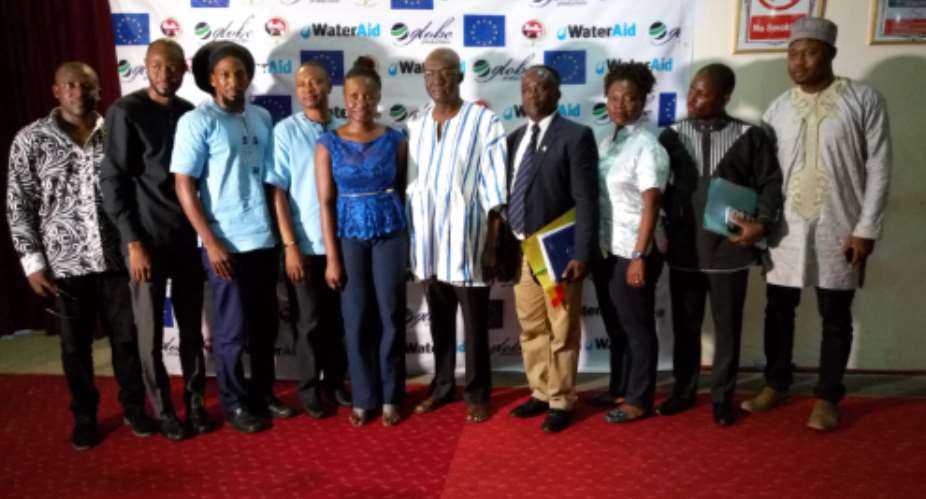The Minister for Sanitation and Water Resources, Joseph Adda has announced government support towards the one house one toilet project, setting up a national sanitation fund and a national sanitation agency proposed by the Coalition of NGO’s in Water and Sanitation (CONIWAS).
Speaking at an event to mark the World Water Day Celebration in Accra, he noted that those policy recommendations are now more important than ever adding that his outfit will use a multi-sectoral approach in working towards achieving these goals.
The sector Minister added that he will involve Ministry of Agriculture, Ministry of Education, Ministry of Health and others to address the major challenges in the sector.
“We are going to have a very bold approach to improving access to sanitation which is currently at 15percent so we can end open defecation and sanitation and water related diseases that cause death of children under five,” he stated.
Hon. Joseph Adda emphasized that it is therefore his responsibility and the mandate of the Ministry to ensure that marginalized groups, regions with lower access rates are prioritized for service provision in the shortest possible time.
According to him, government has made significant and ambitious commitments under the new Sustainable Development Goals (SDGs) which implies that government is expected to dedicate significant resources to meet that obligation.
“While acknowledging that we have made significant progress in terms of water delivery which stands at 89%, our coverage for sanitation is still quiet abysmal,” he intimated.
Christopher Ackon, Programme Officer, EU-Ghana, indicated that safe drinking water and sanitation are crucial for a healthy and dignified life yet, 663 million people, 1 out of 10 people in the world, still lack access to safe water and are deprived of a basic human right.
He noted that the world has also fallen short of the sanitation target, leaving still 2.4 billion people, 1 out of 3 people, without access to adequate sanitation facilities.
Mr. Ackon added that the persistence of water scarcity and water stress, given climate change and demographic developments, are likely to affect more and more people in the future.
He noted that in Ghana, some of the major challenges to quality water provision are the continuous deterioration of the water bodies due to high population growth density, urbanization, climate change variabilities, and uncontrolled agriculture especially along water bodies.
Mr. Ackon also mentioned activities of illegal miners (galamsey), deforestation, and land degradation and pollution as a result of surface runoffs from large agro chemical fields, indiscriminate dumping of refuse and untreated domestic waste, and more.
According to him, these elements seriously impact negatively on provision of good quality water.
“Quite recently in the news, it was reported of how the activities of illegal miners in the Western region have affected the quality of the Ankobra River. The activities of illegal loggers and miners in the Atewa forest in the Eastern region are also impacting on the integrity of the forest and the water bodies that the forest protects. Across the nation, several more watersheds and water bodies that serve as water sources for Ghana Water Company are seriously under threat,” he stated.
The UN-Ghana rep intimated that if these activities are not halted and addressed, Ghana is getting to a point where they may have to import water.
Mr. Ackon posited that we all have a role to play and that the state should not sit back to allow a few citizens to destroy the very resource essential for our survival.
He said, on the occasion of World Water Day, as European Union they reiterate their commitment, through Agenda 2030, to achieve access and sustainable management of water and sanitation for all, in particular to the most vulnerable groups.
“Our commitment to leaving no-one behind means that no-one should be deprived of access to clean water. We also reiterate our commitment to the Paris Agreement and the Marrakech Action Proclamation which reaffirmed the world's determination to fight climate change and to help address the impacts of climate change, including on water,” Mr. Ackon noted.
He posited that we need to reflect on what we can do additionally to ensure that water can be available for both current and future generations. We need to collectively work to address the challenges in the water sector from source to delivery.
According to him, we need to strengthen our institutions to play their roles to protect the resource and also to avoid wastage.
He concluded that posterity will not forgive this generation if we are to continue doing "business-as-usual" in this sector adding that this will be a total disaster.
 2017-03-25 103442
2017-03-25 103442
 2017-03-25 103500
2017-03-25 103500





 Akufo-Addo commissions Phase II of Kaleo solar power plant
Akufo-Addo commissions Phase II of Kaleo solar power plant
 NDC panics over Bawumia’s visit to Pope Francis
NDC panics over Bawumia’s visit to Pope Francis
 EC blasts Mahama over “false” claims on recruitment of Returning Officers
EC blasts Mahama over “false” claims on recruitment of Returning Officers
 Lands Minister gives ultimatum to Future Global Resources to revamp Prestea/Bogo...
Lands Minister gives ultimatum to Future Global Resources to revamp Prestea/Bogo...
 Wa Naa appeals to Akufo-Addo to audit state lands in Wa
Wa Naa appeals to Akufo-Addo to audit state lands in Wa
 Prof Opoku-Agyemang misunderstood Bawumia’s ‘driver mate’ analogy – Miracles Abo...
Prof Opoku-Agyemang misunderstood Bawumia’s ‘driver mate’ analogy – Miracles Abo...
 EU confident Ghana will not sign Anti-LGBTQI Bill
EU confident Ghana will not sign Anti-LGBTQI Bill
 Suspend implementation of Planting for Food and Jobs for 2024 - Stakeholders
Suspend implementation of Planting for Food and Jobs for 2024 - Stakeholders
 Tema West Municipal Assembly gets Ghana's First Female Aircraft Marshaller as ne...
Tema West Municipal Assembly gets Ghana's First Female Aircraft Marshaller as ne...
 Dumsor is affecting us double, release timetable – Disability Federation to ECG
Dumsor is affecting us double, release timetable – Disability Federation to ECG
